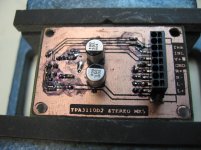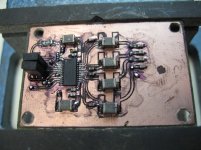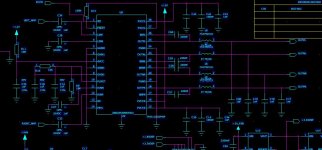Hey out there,
This is my first class D amp project, it's built around the TPA3110D2 IC from Texas Instruments (d/s here) I have essentially used the schematic right from the d/s (fig. 37), with a few embellishments from the evaluation module schematic (evm d/s with schematic here) (i.e. gain control jumpers, adjustable power limit, a ferrite bead on the power supply, not really sure what that's for...). All that aside, the compound schematic I came up and am using for this project is here. I'm powering the unit from a 14.4V NiMH battery pack (12 D cells) and the audio source is my mp3 player (iPod.) Currently, the amp is set up to drive a pair of 4 ohm, 100 W rated power speakers. (4 inch)
My problem is this:
The amp only seems to work at low volume. As soon as I turn the iPod's volume above a third of it's capacity, the amp starts to auto-reset for some reason. After sniffing around on the internet, I am starting to wonder if it is shutting down due to over-current protection as a result of using low impedance (4 ohm) speakers. Does anyone out there have any knowledge of what might be going on here and what I need to do to remedy it? If I had a pair of 8 ohm speakers sitting around, I would have tried that, I'll keep my eyes and ears open for a cheapo pair.
Alternatively, this post leads me to believe that I may be forcing the amp into thermal shutdown. However, according to the d/s, thermal shutdown is not reported on the FAULT pin of the amp, and whatever is going on with my amp definitely is.
THANKS!
-CHAD
PS - As a side question, if you were going to build a class D amp from scratch with similar exterior component parameters, what amp would you go with? Again those parameters are: 14.4 V Battery pack power supply (somewhere around 2000mAH) and either a single mono or a pair of stereo 4 ohm, 100 W rated power speakers.
This is my first class D amp project, it's built around the TPA3110D2 IC from Texas Instruments (d/s here) I have essentially used the schematic right from the d/s (fig. 37), with a few embellishments from the evaluation module schematic (evm d/s with schematic here) (i.e. gain control jumpers, adjustable power limit, a ferrite bead on the power supply, not really sure what that's for...). All that aside, the compound schematic I came up and am using for this project is here. I'm powering the unit from a 14.4V NiMH battery pack (12 D cells) and the audio source is my mp3 player (iPod.) Currently, the amp is set up to drive a pair of 4 ohm, 100 W rated power speakers. (4 inch)
My problem is this:
The amp only seems to work at low volume. As soon as I turn the iPod's volume above a third of it's capacity, the amp starts to auto-reset for some reason. After sniffing around on the internet, I am starting to wonder if it is shutting down due to over-current protection as a result of using low impedance (4 ohm) speakers. Does anyone out there have any knowledge of what might be going on here and what I need to do to remedy it? If I had a pair of 8 ohm speakers sitting around, I would have tried that, I'll keep my eyes and ears open for a cheapo pair.
Alternatively, this post leads me to believe that I may be forcing the amp into thermal shutdown. However, according to the d/s, thermal shutdown is not reported on the FAULT pin of the amp, and whatever is going on with my amp definitely is.
THANKS!
-CHAD
PS - As a side question, if you were going to build a class D amp from scratch with similar exterior component parameters, what amp would you go with? Again those parameters are: 14.4 V Battery pack power supply (somewhere around 2000mAH) and either a single mono or a pair of stereo 4 ohm, 100 W rated power speakers.
Hi CHAD.
The shutdown is quite effective.
I have used the TPA3123 a lot, and i am working with the TPA3110.
They shutdown on overcurrent and overtemperature.
The overtemp is not reported on the \fault pin.
You have to be sure that the powerpad is connected to a large GND plane.
This is taken from the datasheet:
THERMAL PROTECTION
Thermal protection on the TPA3110D2 prevents damage to the device when the internal die temperature
exceeds 150°C. There is a ±15°C tolerance on this trip point from device to device. Once the die temperature
exceeds the thermal set point, the device enters into the shutdown state and the outputs are disabled. This is not
a latched fault. The thermal fault is cleared once the temperature of the die is reduced by 15°C. The device
begins normal operation at this point with no external system interaction.
Thermal protection faults are NOT reported on the FAULT terminal.
The shutdown is quite effective.
I have used the TPA3123 a lot, and i am working with the TPA3110.
They shutdown on overcurrent and overtemperature.
The overtemp is not reported on the \fault pin.
You have to be sure that the powerpad is connected to a large GND plane.
This is taken from the datasheet:
THERMAL PROTECTION
Thermal protection on the TPA3110D2 prevents damage to the device when the internal die temperature
exceeds 150°C. There is a ±15°C tolerance on this trip point from device to device. Once the die temperature
exceeds the thermal set point, the device enters into the shutdown state and the outputs are disabled. This is not
a latched fault. The thermal fault is cleared once the temperature of the die is reduced by 15°C. The device
begins normal operation at this point with no external system interaction.
Thermal protection faults are NOT reported on the FAULT terminal.
Thanks for the reply Sonnya, especially on such an old post.
I've experimented a bit with the TPA3110 chip, with varying results. I think you raise a good point regarding the powerpad connection. Unfortunately, I do all of my work in my dining room, (moving to the garage now that it's getting a little warmer here in Montana.) As such, I've had a real problem soldering the chip down to the pad properly. It's come to the point where I either need to find a cheap, home-brew way to properly solder the chip to the power pad or find a similar class-D amp chip that does not require the powerpad. I would welcome any advice you might have!
Thanks,
Chad
I've experimented a bit with the TPA3110 chip, with varying results. I think you raise a good point regarding the powerpad connection. Unfortunately, I do all of my work in my dining room, (moving to the garage now that it's getting a little warmer here in Montana.) As such, I've had a real problem soldering the chip down to the pad properly. It's come to the point where I either need to find a cheap, home-brew way to properly solder the chip to the power pad or find a similar class-D amp chip that does not require the powerpad. I would welcome any advice you might have!
Thanks,
Chad
Hi,
I have very good results with the tpa3110d2, getting 30 W sine power from it with ease !
but without the thermal pad on the under site connected it will shut down every second!
I made a pcb with some extra big vias to solder the thermal pad with a normal soldering iron.
Gr Rik
I have very good results with the tpa3110d2, getting 30 W sine power from it with ease !
but without the thermal pad on the under site connected it will shut down every second!
I made a pcb with some extra big vias to solder the thermal pad with a normal soldering iron.
Gr Rik
Thanks Gr Rik,
I put some slightly-larger-than-normal vias in the thermal pad on the last experimental amp. After spending an hour trying to get the chip to soak up the solder through the vias with copper wire and an extra hot iron, I gave up without success. As you might imagine, the amp didn't perform, i.e. repeatedly shut down.
When I get my new work area set up I'll try even bigger vias. I suppose I'll just go ahead and make them big enough to fit the end of the iron in (1/32) and make contact with the bottom side of the chip.
Again, thanks for the advice.
Chad
I put some slightly-larger-than-normal vias in the thermal pad on the last experimental amp. After spending an hour trying to get the chip to soak up the solder through the vias with copper wire and an extra hot iron, I gave up without success. As you might imagine, the amp didn't perform, i.e. repeatedly shut down.
When I get my new work area set up I'll try even bigger vias. I suppose I'll just go ahead and make them big enough to fit the end of the iron in (1/32) and make contact with the bottom side of the chip.
Again, thanks for the advice.
Chad
this is what worked for me the big vias are a little les than 1mm.
now i only use solder paste and reflow soldering for smd, less work and cleaner soldering.
Rik
now i only use solder paste and reflow soldering for smd, less work and cleaner soldering.
Rik
Attachments
Last edited:
Like this it will work with a normal temp soldering iron and some thin solder.
Rik
Yes, he is right about it. 🙂
Great, thanks again for the replies.
The TPA3110 seems like the perfect chip for the projects I'm working on, hopefully this will clear up the problems I've been having with it.
Thanks again,
Chad
The TPA3110 seems like the perfect chip for the projects I'm working on, hopefully this will clear up the problems I've been having with it.
Thanks again,
Chad
Trouble aplenty
Good news: I got my new work space set up.
Bad news: I seem to have built a dead TPA3110D2 amp. The bigger vias seemed to do the trick to get the powerpad soldered properly. Unfortunately the amp just doesn't seem to want to power up. I can't even get pops or cracks out of it. I've checked and double checked the connections between and to the pins on the amp. I had to fix two shorts and replace a 10 ohm resister (on the AVCC pin #7), not really sure how I burned that up... Maybe there's something I'm missing. Hopefully I'll figure out what that is soon.
I built two test amps previously around the TPA3110D2, and while I didn't perfect them, I could at the very least get them to try...
-Chad
Good news: I got my new work space set up.
Bad news: I seem to have built a dead TPA3110D2 amp. The bigger vias seemed to do the trick to get the powerpad soldered properly. Unfortunately the amp just doesn't seem to want to power up. I can't even get pops or cracks out of it. I've checked and double checked the connections between and to the pins on the amp. I had to fix two shorts and replace a 10 ohm resister (on the AVCC pin #7), not really sure how I burned that up... Maybe there's something I'm missing. Hopefully I'll figure out what that is soon.
I built two test amps previously around the TPA3110D2, and while I didn't perfect them, I could at the very least get them to try...
-Chad
Attachments
Okay, up and running now. Thanks Nigel, I double checked the data sheet; the over current protection appears to be handled entirely internally. It was all a boneheaded mistake on my part due to a fairly shoddily etched board (I ran out of some of my materials and decided to try to make due by making on-the-fly repairs to a poorly etched board.) The culprit ended up being that pins 9 and 10 (GVDD and PLIMIT respectively) were shorted to ground. Sorry guys, newbie mistake... fittingly so.
The proper grounding to the powerpad made all the difference with the auto-reset. Seems to be all cleared up. Thanks again Sonnya and Rik. The TPA3110D2 is a dandy of a little chip, I look forward to using it in some future projects now that this kink is worked out.
Thanks again,
Chad
The proper grounding to the powerpad made all the difference with the auto-reset. Seems to be all cleared up. Thanks again Sonnya and Rik. The TPA3110D2 is a dandy of a little chip, I look forward to using it in some future projects now that this kink is worked out.
Thanks again,
Chad
Happy to see that you got it working. Where I used to use the TPA3110D2 I'm now using the TPA3117D2, smaller package and QFN is faster to solder 😀
Rik
Rik
Last edited:
- Status
- Not open for further replies.
- Home
- Amplifiers
- Class D
- TPA3110D2 Auto-reset at normal volume



